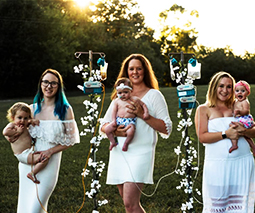Breast is best, but not best for the American economy

Back in 1974, a vocal group of activists who called themselves The War On Want drew the world’s attention to the unconscionable marketing of infant formula to Third World countries.
History repeating itself
44 years later, you wouldn’t think we’d be having the same conversation. But here we are again.
In May of this year, a group of government delegates gathered in Geneva for the United Nations-affiliated World Health Assembly. As reported in The New York Times, their aim was to promote breastfeeding over man-made infant formula, worldwide.
“Based on decades of research, the resolution says that mother’s milk is healthiest for children and countries should strive to limit the inaccurate or misleading marketing of breast milk substitutes.”
So far so good. This is a no-brainer for everyone, isn’t it? Well, not to the Trump administration.
Watering down of the resolution
According to multiple sources, American officials tried to tweak things a little. Why? To make sure the interests of baby formula manufacturers were protected. And by ‘interests’ of course, I mean, hip pockets.
Specifically, the US officials sought to “water down the resolution by removing language that called on governments to ‘protect, promote and support breastfeeding’” But wait, that’s not all! They also wanted to soften up another passage that called on policymakers to “restrict the promotion” of food products that could, according to research, possibly be harmful to children.
The resolution itself – to promote the benefits of breastfeeding over man-made infant formula – was specifically aimed at developing countries, with Ecuador one of many who were planning to introduce the measure.
It’s one thing for middle class, educated First World women to be given the choice to feed their children infant formula, but it’s entirely another for underprivileged women in developing countries to be pushed in that direction by government-endorsed marketing initiatives that seek to promote man-made formula as comparable, or even better, than the free stuff most women have on tap.
According to diplomats and government officials who took part in the discussions, American officials strong-armed the Ecuadorian government into dropping the resolution. Specifically, they threatened “punishing trade measures and withdrawal of “crucial military aid.”
Ecuador acquiesced and health advocates “scrambled to find another sponsor.” Poor nations such as Africa and Latin America – a.k.a the ones who most need this sort of resolution in order to protect their babies from the marketing push of man-made baby formula at the expense of breastmilk – were now unwilling to endorse the resolution, for fear of reprisals from the world’s biggest economic bully: the USA.
“What happened was tantamount to blackmail, with the US holding the world hostage and trying to overturn nearly 40 years of consensus on the best way to protect infant and young child health,” Patti Rundall, policy director of the British advocacy group Baby Milk Action, told The New York Times.
Didn’t we already fix this mess?
But we’ve been here before and I think we all assumed it had been dealt with. It’s like tidying up your house during school holidays only to find your kids crap scattered all over the house five minutes later: didn’t we already fix this mess?
Back in 1974, a report called The Baby sparked a worldwide boycott of Nestle by bringing attention to the underhanded way Nestle was marketing man-made infant formula to poor women in underdeveloped nations.
The point was – aside from ‘breast is best’ – the safe administering of infant formula relies on sterilisation and access to clean water. Both of which were not (and are still not) in abundant supply in poorer nations like Africa and Latin America. Lack of education also makes mothers more susceptible to marketing ploys like “sales girls dressed up in nurses uniforms, giveaway samples and free gift gimmicks that persuade mothers to give up breastfeeding.”
So that was 44 years ago. And … didn’t we already fix this mess?
What is America doing? We’re smarter and more globally responsible than this in the 21st Century, aren’t we? The World Health Assembly is trying to play the long game on world health – putting resolutions in place to stop the marketing push of man-made infant formula across the world – and America is circling the wagons around their precious economy.
In the end, the United States wasn’t able to stop the resolution going through. Russia stepped in to introduce the measure and, with the wording still slightly watered down to protect baby formula manufacturers, the Americans backed off.
As Ilona Kickbusch, director of the Global Health Centre at the Graduate Institute of International and Development Studies in Geneva, told The New York Times, “if you can’t agree on health multilateralism, what kind of multilateralism can you agree on?”
And if the Russians are showing you up on matters of principle?
Go home, America, you’re drunk.









